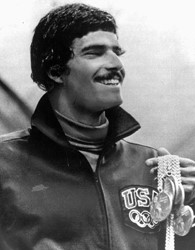Mark Spitz was a brash swimming prodigy who overcame disappointment in the 1968 Olympics to win seven gold medals in 1972, setting a record that would stand for 36 years.
Mark Spitz’s Early Days
Mark Andrew Spitz was born February 10, 1950, in Modesto, Calif., to Arnold and Lenore Spitz. When Mark was 2, his family moved to Honolulu, where Mark swam at the beaches of Waikiki. “You should have seen that little boy dash into the ocean,” Mrs. Spitz told Time. “He’d run like he was trying to commit suicide.”
His family returned to California after four years and Mark began to swim competitively. His father pushed him to be the best, telling him, “Swimming isn’t everything; winning is.” When Mark was 14, his family moved to Santa Clara so he could train under renowned swim coach George Haines, who helped him set national and international records throughout high school.
Sources in this Story
- Time: Water Baby to Beat
- ESPN: Spitz lived up to enormous expectations
- Time: Spitz
- ESPN: Swimming’s golden boy
- USA Today (AP): Spitz golden once again in Phelps spotlight
Spitz’s Swimming Career
The 18-year-old Spitz was considered one of the world’s top swimmers as he headed into the 1968 Mexico City Olympics. He boldly predicted that he would win six gold medals, earning the ire of many of his teammates, who found him arrogant. Spitz flopped in Mexico City, winning just two relay golds, a silver and a bronze; in his final race, the 200-meter butterfly, he finished dead last in the final.
He spent the next four years at Indiana University, where he won eight NCAA swimming titles and three World Swimmer of the Year awards. He went into the 1972 Munich Olympics entered in seven events, but he didn’t make any predictions this time around.
He won gold in his first five races, setting a world record in each. But again there was friction between Spitz and his teammates, as Steve Genter accused Spitz of trying to talk him out of competing due to injury.
Spitz also caused controversy when he was asked what he, as a Jew, felt about competing in Germany three decades after the Holocaust. Spitz said that he always liked Germany and then, while pointing to a lampshade, quipped, “Even though this shade is probably made out of one of my aunts.”
He considered pulling out of his sixth race, the 100-meter freestyle, where fellow American Jerry Heidenreich threatened to end his perfect record. “It’s tremendous—the pressure of not losing,” Spitz said. “I’d rather win six out of six, or even four out of four, then six out of seven.”
Spitz chose to race and defeated Heidenreich by a half-stroke for his sixth gold. He finished the Games with a seventh gold in the 4x100m medley relay, but his accomplishment would soon be overshadowed by tragedy.
In the early morning hours of September 5, the night following Spitz’s seventh victory, Palestinian terrorists killed two members of the Israeli team and kidnapped nine others. Spitz, a Jew, was flown to London for his protection.
Spitz returned to the United States to a hero’s welcome. He became a national celebrity and sex symbol, and a poster of him wearing a Speedo and seven gold medals became one of the most popular sports posters ever. He retired from swimming to focus on building his commercial image, signing many endorsements and attempting to begin a show business career.
The Rest of the Story
Spitz’s Hollywood career proved unsuccessful. He briefly returned to swimming in 1989, but he failed to qualify for the 1992 Olympics and retired again. He now works as a stockbroker and motivational speaker.
He returned to the international stage during the 2008 Olympic Games, when American swimmer Michael Phelps took aim at his gold-medal record. When Phelps, who went on to break Spitz’s record with eight gold medals, tied the record, Spitz graciously praised Phelps.
“I’m ecstatic,” he told the Associated Press. “I always wondered what my feelings would be. I feel a tremendous load off my back.”
This article was originally written by Denis Cummings; it was updated December 29, 2016.











